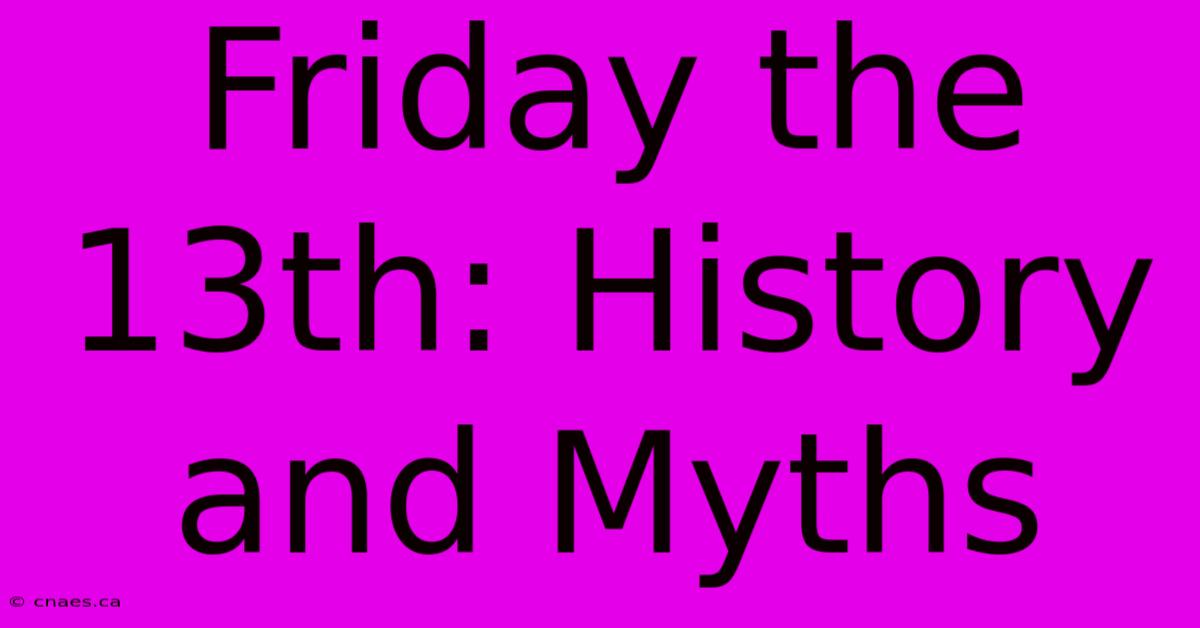Friday The 13th: History And Myths

Discover more detailed and exciting information on our website. Click the link below to start your adventure: Visit My Website. Don't miss out!
Table of Contents
Friday the 13th: History and Myths
Friday the 13th. Just the phrase conjures images of black cats, broken mirrors, and walking under ladders. But where did this pervasive superstition come from? Is it simply a modern invention, or are there deeper, darker roots to this fear? Let's delve into the history and myths surrounding this infamous day.
The Historical Roots of Friday the 13th
While the modern association of Friday the 13th with bad luck is relatively recent, the individual components—fear of the number 13 and negative connotations surrounding Friday—have ancient origins.
The Number 13: Triskaidekaphobia
The fear of the number 13, known as triskaidekaphobia, is deeply rooted in various cultures and religions. Some cite the Last Supper, where 13 people were present before the betrayal and crucifixion of Jesus. In Norse mythology, there's the tale of 12 gods attending a feast, where a 13th uninvited guest, Loki, caused the death of Baldr, one of the beloved gods. These narratives contribute to the negative associations surrounding the number 13.
Friday: A Day of Ill Omen
Friday has long held negative connotations in many cultures. In Christian tradition, it's associated with the crucifixion of Jesus. Some interpretations connect it with the pagan goddess Frigg, whose day was Friday in Norse mythology, and who was later associated with witchcraft and misfortune. This historical baggage adds to the overall negative aura surrounding Friday.
The Myth of Friday the 13th: A Modern Confluence?
The specific combination of Friday and the 13th as a single ominous day isn't as ancient as the individual fears. The most commonly cited theory links its modern popularity to the Friday the 13th film series, popularizing the superstition to a global audience. However, evidence suggests the association might have been brewing for longer.
Early Mentions and Folk Beliefs
While the widespread modern fear is relatively new, anecdotal evidence suggests that associations between Friday the 13th and bad luck existed centuries ago, possibly fuelled by pre-existing negative associations with both Friday and the number 13. This suggests that the current widespread fear built upon existing cultural beliefs, rather than emerging from the films alone.
The Psychology Behind the Fear
The fear of Friday the 13th isn't just a simple superstition; it's a psychological phenomenon. It taps into our inherent anxieties about things we cannot control, reinforcing pre-existing biases against unlucky numbers and days. The power of suggestion and confirmation bias also play a significant role. If someone believes Friday the 13th is unlucky, they might be more likely to notice negative events on that day, reinforcing their belief.
Overcoming Triskaidekaphobia
While completely eliminating the fear might be challenging, understanding its origins and the psychological mechanisms behind it can help in managing and mitigating its impact. Rationalizing the fear, actively challenging negative thoughts, and focusing on positive aspects of the day can be helpful coping mechanisms.
Conclusion: Embracing Friday the 13th
Ultimately, whether you believe in the ill fortune associated with Friday the 13th or not is a personal choice. However, understanding its rich historical and cultural context can provide valuable insight into the enduring power of superstition and the fascinating interplay between cultural beliefs and individual psychology. Perhaps, instead of fearing Friday the 13th, we should view it as a day to reflect on the power of collective beliefs and the enduring human fascination with the uncanny. After all, a little bit of healthy skepticism can be just as potent as any superstition.

Thank you for visiting our website wich cover about Friday The 13th: History And Myths. We hope the information provided has been useful to you. Feel free to contact us if you have any questions or need further assistance. See you next time and dont miss to bookmark.
Also read the following articles
| Article Title | Date |
|---|---|
| Sharif Case Unanswered Questions Remain | Dec 13, 2024 |
| Campbell Refuses To Play Egoist | Dec 13, 2024 |
| Eversheds Irish Arm Weighs Tie Up | Dec 13, 2024 |
| Man Utd Plzen Europa League Game Result | Dec 13, 2024 |
| Antibiotics Market Booming Globally | Dec 13, 2024 |
